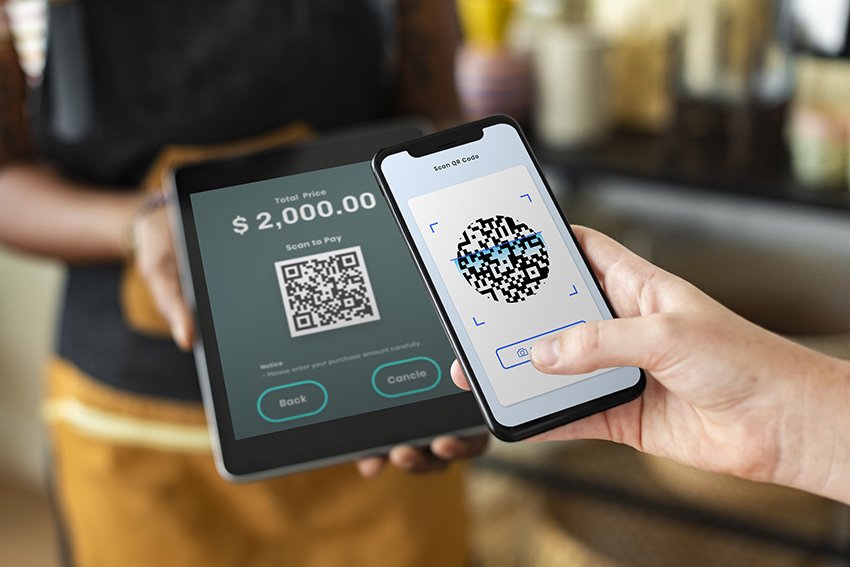Avoid Losing Money To Scammers and Protect Yourself From UPI Frauds While fraudsters and UPI scams are at an all-time high, it is crucial to stay vigilant and well-informed


Small business QR code cashless payment at store
By Neha Mehrotra
We are living in a QR-coded world; look around, and everywhere you’ll find these pixelated codes facilitating money transfers and payments for goods and services. They are not just a common sight in shops and establishments, but they’re so widespread that my friend had even set a QR code as his phone wallpaper. When asked about this unconventional choice, he swiftly responded: It’s easy, secure, and almost instantaneous. However, the ease of use also comes with an inherent risk: falling victim to UPI scams. According to the Union Finance Ministry, the country experienced around 95,000 UPI transaction fraud cases in 2022–2023.
In today’s digital era, where cyber crimes are continuously rising and taking new forms, it boils down to being aware of what steps and measures you should take as a customer who uses digital payment on a day-to-day basis. Here are some safety tips to help you protect your hard-earned money from potential UPI frauds and scams:
Never Disclose Your Credentials
The most important rule for keeping yourself safe is to never share your PIN with anyone. Giving your PIN or any UPI information to strangers or responding to unknown messages or calls is like opening the door to your accounts. Be careful of fake UPI IDs, especially for donations. Scammers make them look real. Be cautious with unfamiliar IDs, and make sure they’re real before sending money. If you’re not sure, it’s safer not to transfer funds.
Authenticate your UPI ID or PIN
Making sure the UPI ID is correct before sending money is crucial to avoid mistakes and scams. Even a small typo can send funds to the wrong account. Always double-check the UPI ID before confirming any transaction, and using QR code scanning instead of typing can reduce the risk of errors. Additionally, remember to change your UPI PIN regularly, just like your email or social media passwords. This adds an extra layer of security and makes it harder for fraudsters to access your account.
Don’t Open Unwanted Links and Messages
Scammers often fraud people through One-Time Password (OTP) scams, which involve tricking individuals into sharing their OTPs, which are often required for secure transactions. Scammers can use OTPs to gain unauthorised access to your accounts. Never share OTPs with anyone unless you feel they are from a trusted source, and always double-check the webpage before entering the OTP. Moreover, the most common scam to take money is by scanning random QR codes. The scammers tell targeted people that they will send them their money using a QR code. But when you scan the QR code and enter your UPI PIN, the money gets deducted from your account instead of the scammer’s.
Beware of Counterfeit Apps
It’s essential to be vigilant about malicious or fake apps that often masquerade as legitimate ones. These fraudulent apps are designed to closely resemble the official banking applications and are easily accessible for download. If, by mistake, you install such a fake app, it can compromise your sensitive information. Once they gain access to your personal information, they may use it to conduct unauthorised transactions, withdraw funds, or engage in other fraudulent activities on your behalf. To avoid falling victim to fake apps, always download applications from official app stores, such as the Google Play Store or Apple App Store.
Follow Some Basic Dos and Don’ts to Keep your Account Safe
Do’s
1. Keep anti-virus and biometric recognition software installed.
2. Keep your details updated with your bank.
3. Keep track of your financial transactions and bank account statements.
4. Alert your bank immediately if you find something unusual.
Don’ts
1. Use unsecure WiFi connections that you don’t trust (open WiFi connections).
2. Avoid logging in to third-party websites, clicking on promotional emails, or using a public computer.
3. Avoid entering your UPI pin while using screen-sharing applications.
More from our site
Recent Posts
Shaping Tomorrow’s Golf Champions With Leela Palace Bengaluru
The 3rd edition of The Leela Golf Tournament celebrated young talent and brought together skill, precision and camaraderie!
The 3rd edition of The Leela Golf Tournament celebrated young talent and brought together skill,…
The Duo Behind KAIA Goa & Gigi Bombay, Redefines Hospitality
In conversation with the founders of Pawan Shahri and Nikita Harisinghani, the duo behind Chrome Hospitality Asia
In conversation with the founders of Pawan Shahri and Nikita Harisinghani, the duo behind Chrome…
Precision, Durability, and Swiss Legacy
Victorinox launches the Swiss Army collection, featuring three distinct models that emphasise exceptional quality, resistance and versatility
Victorinox launches the Swiss Army collection, featuring three distinct models that emphasise exceptional quality, resistance…
A New Era of Luxury Interiors With Sussanne & Gauri Khan
Sussanne Khan & Gauri Khan unite to bring an awe-inspiring, six-storey sanctuary of luxury, art, and design in Hyderabad
Sussanne Khan & Gauri Khan unite to bring an awe-inspiring, six-storey sanctuary of luxury, art,…
Air India x Lufthansa: Fly To These International Destinations Now
Expanding their codeshare partnership, Air India and Lufthansa Group have added 100 new routes to their combined network
Expanding their codeshare partnership, Air India and Lufthansa Group have added 100 new routes to…
Luxury’s Most Recent & Vibrant Launches This Season
The luxury landscape is brimming with bold innovations, striking partnerships, and immersive experiences
The luxury landscape is brimming with bold innovations, striking partnerships, and immersive experiences

